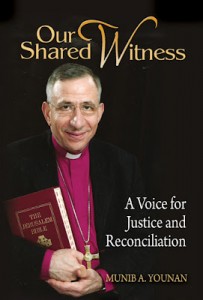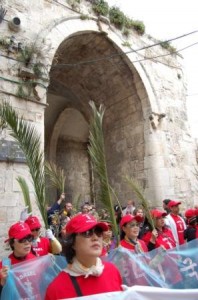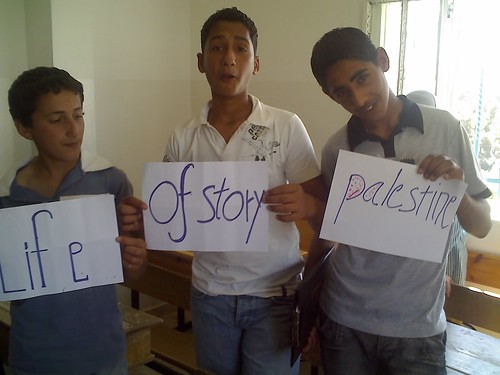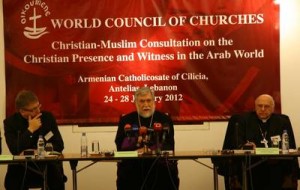 The Rt. Rev. Bishop Munib Younan, President of the Lutheran World Federation (LWF) and Bishop of the Evangelical Lutheran Church in Jordan and the Holy Land (ELCJHL) has written a new book called OurShared Witness: A Voice for Justice and Reconciliation. Bishop Younan is known as a bridge-builder, an ambassador of reconciliation, a prophetic voice and an advocate for justice, peace, and non-violence.
The Rt. Rev. Bishop Munib Younan, President of the Lutheran World Federation (LWF) and Bishop of the Evangelical Lutheran Church in Jordan and the Holy Land (ELCJHL) has written a new book called OurShared Witness: A Voice for Justice and Reconciliation. Bishop Younan is known as a bridge-builder, an ambassador of reconciliation, a prophetic voice and an advocate for justice, peace, and non-violence.
In the world in which he lives – where Palestinians struggle for life and coexistence with their neighbor Israelies – one might imagine that despair and hopelessness dominate. However, in reading Bishop Younan’s writings readers will find unending hope for a future of peace and goodwill, along with an optimistic determination to be part of the solution for this troubled Holy Land.
This collection of writings, speeches, and sermons reveals Bishop Younan’s context, his perspective, and his hope. Readers will find his theology to be contextual—deeply rooted in his daily reality as a Palestinian Christian —while at the same time being universal, offering insights and principles that apply to other situations in vastly different parts of the world.
Order his book at http://www.lutheranupress.org/Books/Our_Shared_Witness.
Table of Contents
Biographical Sketch
Foreword
Part One: The Life and Work of Lutherans in the Holy Land
The Evangelical Lutheran Church in Jordan and the Holy Land
Adapting to a Changing Environment while Drawing Strength
from Deep Christian Roots
Lutheran Interest in the Middle East: A Historical Survey
Fifty Years of Living Witness and Creative Diakonia
Word for Graduates of ELCJHL Schools
Part Two: Messages of Reconciliation for a World of Division
Justice, Reconciliation, and Hope: United for God’s Mission
Reforming Luther: Toward a Prophetic Interfaith Dialogue
Among Christians, Jews, and Muslims
Give Us Today Our Daily Bread
What’s Lutheran about Health Care? Insights from Martin Luther
Ecumenism Is Reconciliation in the Middle East and in the World
Jerusalem Today and Tomorrow: Four Visions
What Does the Lord Require of Us? A Vision of Peace through Justice
The Church’s Commitment to Non-Violence
Bring Religion Back to the Front Lines of Peace
The Role of Religion in the Middle East
Why Lutherans Should Recognize Interfaith Harmony Week
A Suggestion for Christian–Muslim Dialogue
Part Three: Sermons about Love for Neighbor and Reconciliation
Fear not! (Luke 2:10)
Living Stones (1 Peter 2:5)
Reformed for Costly Discipleship and Creative Diakonia
With Eyes and Ears on Jesus (Matthew 17:1-9)
Jesus’ Strategy Session for the Early Church (John 14:1-14)
I Am the Resurrection and the Life (John 11:25)
One in the Apostles’ Teaching (Acts 2:42)
Living as the Children of Light (Ephesians 5:8)
Welcoming the Stranger (Matthew 25:31-46)
Christ–the Hope of the World (Ephesians 1:15-23)
Planting a Tree for the Future (Genesis 8:11)



